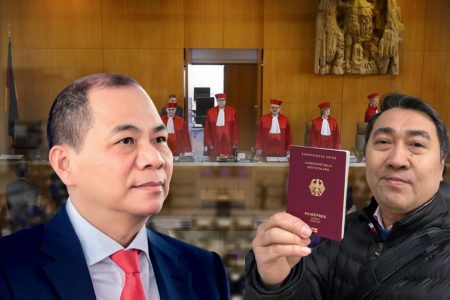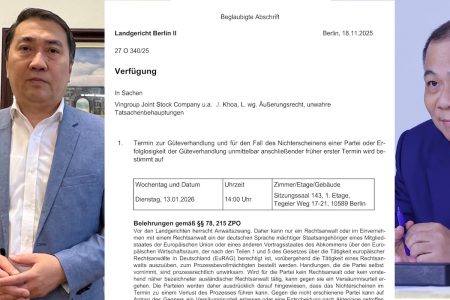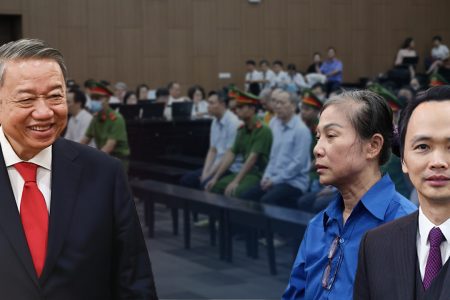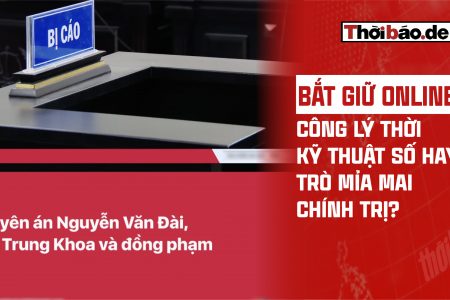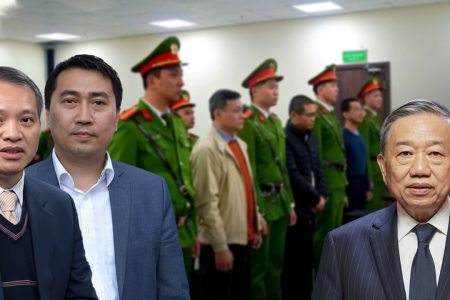
Phạm Đoan Trang & William Nguyễn, tháng 9 năm 2020
Tóm tắt sự kiện
Khoảng từ 1 đến 3h sáng ngày mùng 09 tháng 01 năm 2020, hàng nghìn cảnh sát thuộc nhiều lực lượng: đặc nhiệm, cơ động, hình sự, trọng án, đặc biệt cảnh sát điều tra, phối hợp với các lực lượng tại địa phương bao vây và tấn công xã Đồng Tâm, nơi cách cánh đồng Sênh –khu vực đất tranh chấp – khoảng 5km.
Trước đó, dân làng không hề được thông báo gì, nhưng có nghe loa truyền thanh xã nhắc đi nhắc lại rằng đất Đồng Tâm là đất quốc phòng – quan điểm mà chính quyền đã lặp lại nhiều lần trong nhiều năm qua về vùng đất tranh chấp này. Ý thức được thông điệp ngầm là chính quyền sẽ tổ chức cưỡng chế, dân Đồng Tâm tuyên bố trong một đoạn video được ghi hình lại vài tiếng đồng hồ trước khi diễn ra vụ tấn công, rằng họ sẽ “chiến đấu tới cùng” để giữ được mảnh đất.
Theo truyền thông độc lập của dân và blogger, phía công an đã cắt mạng internet và phá sóng điện thoại trước, sau đó ồ ạt tiến vào làng với hơi cay và lựu đạn, chất nổ. Cuối cùng, công an xông vào nhà riêng của ông Lê Đình Kình – người được xem như thủ lĩnh tinh thần của ngôi làng –và bắn chết ông.
Các nhân chứng thuật lại cảnh “hàng ngàn cảnh sát tiến quân vào làng” ném lựu đạn gây choáng, bắn đạn hơi cay, đạn cao su, chặn tất cả các ngả đường và ngõ ngách, đánh đập người dân trong làng một cách bừa bãi, kể cả phụ nữ và người già.
Buổi sáng 09/01, 26 người, phần lớn là thành viên đại gia đình ông Lê Đình Kình, đã bị công an bắt. Cùng lúc, các trang mạng của đội ngũ dư luận viên ở Việt Nam đưa tin “có ba chiến sĩ hy sinh” vì bị “bọn khủng bố” sát hại, cùng hình ảnh một thi thể cháy đen, không nhận rõ nhân dạng.
Báo đài chính thống của nhà nước, chỉ lấy nguồn tin duy nhất từ Bộ Công an, cho hay, người dân đã tấn công công an bằng “lựu đạn, bom xăng và dao” khi lực lượng công quyền đang dựng tường rào bảo vệ sân bay Miếu Môn. Nguồn tin của công an cũng cáo buộc dân làng đã cản trợ người thi hành công vụ và “gây rối trật tự công cộng” – một thuật ngữ thường được gán cho tất cả các hành động phản kháng chính quyền tại Việt Nam.
Các bức ảnh chụp và video được đăng tải trên mạng xã hội đã cho thấy rất nhiều bằng chứng về việc nhà chức trách đã bạo hành người dân, bao gồm một đoạn video mà trong đó bà Dư Thị Thành – vợ của ông Kình – kể về việc đã bị công an tra tấn để ép khai nhận chồng bà đã dùng lựu đạn để tấn công lực lượng chức năng.
Ngày 13/01, truyền thông nhà nước phát đi hình ảnh của một số người dân làng bị bắt, với khuôn mặt xây xát và thâm tím, cúi đầu nhận tội. Báo chí cũng công bố quyết định của công an khởi tố 26 cá nhân, trong đó có 5 người là con trai và cháu của ông Kình là Công, Chức, Quang, Doanh và Uy, vì tội “giết người” và “chống người thi hành công vụ”. Trong những tháng sau đó, công an tiếp tục bắt giam thêm vài người dân Đồng Tâm khác.
Về tác giả
Phạm Đoan Trang là một nhà báo, nhà hoạt động dân chủ ở Việt Nam. Tốt nghiệp chuyên ngành kinh tế quốc tế, Đại học Ngoại thương Hà Nội, Đoan Trang đã làm việc trong lĩnh vực truyền thông (báo chí, truyền hình, xuất bản) từ cuối năm 2000. Hiện Đoan Trang là biên tập viên của Luật Khoa tạp chí.
Đoan Trang là tác giả, đồng tác giả của nhiều cuốn sách, trong đó có: “Anh Ba Sàm”, “Từ Facebook xuống đường”, báo cáo “Toàn cảnh thảm họa môi trường biển Việt Nam” (2016), “Chính trị bình dân” (2017), “Phản kháng phi bạo lực” (2017), “Học chính sách công qua chuyện đặc khu” (2018), “Politics of a Police State” (2019).
Will Nguyen là một người viết, một nhà hoạt động dân chủ. Anh cộng tác với nhiều tổ chức xã hộidân sự ở khu vực châu Á-Thái Bình Dương, làm các công việc: đào tạo nhà hoạt động, biên dịch sách (các tác phẩm của giới đối kháng) và biên tập báo chí, cũng như vận động quốc tế cho mục đích cải cách chính trị ở Việt Nam.
Anh tốt nghiệp Đại học Yale năm 2008 với bằng cử nhân ngành nghiên cứu Đông Á, và vào năm 2018, sau khi tốt nghiệp cao học chính sách công tại Đại học Quốc gia Singapore, đã bị bắt giam và bỏ tù ở Việt Nam một thời gian do tham gia biểu tình.
Toàn văn báo cáo tại đây: https://drive.google.com/file/d/1lyghZgxJomcZM8CPTd2nWlhnRKz9paZQ/view?fbclid=IwAR2yDW4N_BDRTXLz8wxJhqESxWGnGOngTHufmvZARTHFVgyXxKKXFffJLNI
==========
Dong Tam Report

by Pham Doan Trang & Will Nguyen, September 2020
Summary: On January 9, 2020, between 1 and 3 AM, thousands of police from the special task, riot, criminal, and investigative units cordon off Dong Tam in coordination with local ground forces and attacked villagers; the early morning attack was the culmination of a long-running dispute over Senh Field, a 59-hectare parcel of land about five kilometers away.
The villagers were never officially notified of the attack but had heard over public loudspeakers the week prior that the land was “for national defense purposes,” a position the government had reiterated for years regarding the disputed piece of land.
Realizing the sudden message was an implicit warning that the government was about to crack down, Dong Tam villagers declared in a video recorded several hours before the attack that they would “fight to the death” to hold onto the land.
Citizen-blogger social media reports say police cut internet and phone lines in pre-meditation, then burst into the village with tear gas and grenades filled with plastic ball bearings. They then descended upon village leader Le Dinh Kinh’s house, shooting and killing Kinh.
Witnesses describe “thousands of police officers rushing into the village” using flash grenades, firing tear gas, shooting rubber bullets, blocking off all pathways and alleys, and beating villagers indiscriminately, including women and old people.
On the morning of January 9, 26 people, the majority of whom were members of elder Le Dinh
Kinh’s extended family were arrested by police. Concurrently, webpages belonging to Vietnam’s public opinion brigade began reporting on the “the deaths of three martyrs” killed by “terrorists,” attaching to these posts ambiguous pictures of charred corpses.
According to state-controlled media, which only quotes an official statement from the Ministry of Public Security (MPS), it was villagers who attacked police with “grenades, petrol bombs, and knives” as officials tried to erect a wall delineating Mieu Mon airport. The statement accuses villagers of obstructing official duties and “disturbing public order,” a catch-all often used to describe anti-government actions in Vietnam.
Video and photo evidence posted on social media provides ample evidence of citizen mistreatment at the hands of the authorities, including a video in which Kinh’s wife, Du Thi Thanh, speaks about how she was tortured by police into giving a false statement that she had used grenades to attack law enforcement officers.
On January 13, state media released photos of some of the arrested villagers admitting guilt—
covered in scrapes and bruises—and announced criminal proceeding against 26 individuals (at time of publication), including five of Kinh’s sons and grandsons: Cong, Chuc, Quang, Doanh, and Uy, for “murder” and “obstruction of officials.”
In the months that followed, police continued to arrest a number of other Dong Tam residents.
On September 7, 2020, 29 individuals from Dong Tam were tried. The trial roiled public opinion; a number of defendants claimed they were tortured into confessing, as police mass-mobilized their forces, crowding the courtroom to maintain order, tightly surveilling Dong Tam commune, as well as human rights activists, and harassing and threatening lawyers. On September 9, after only three days, the Procuracy recommended the death sentence for Le Dinh Cong and Le Dinh Chuc (two of LeDinh Kinh’s sons). On Monday, September 14, the court sentenced Le Dinh Cong and Le Dinh Chuc to death, Le Dinh Doanh (Kinh’s grandson) to life in prison, and elder Bui Viet Hieu to 16 years in prison.
On paper and in media, the police, the Procuracy, and the People’s Court of Hanoi consistently refer to the government’s attack on Dong Tam the night of January 9 as “the case of murder and obstruction of officials that occurred in Hoanh village, Dong Tam, My Duc, Hanoi, January 9, 2020.”
Because we do not agree with this incriminating (and cumbersome) moniker, this report will refer to the occurrence as “the Dong Tam incident,” “the Dong Tam event,” or “the Dong Tam attack.”
Report content
I. Event summary
4
II. Brief Q&As regarding the Dong Tam attack 6
III. Background of the Dong Tam land dispute
11
IV. Chronology of the Dong Tam land dispute 14
V. Government response: inconsistent information and suppression 20
VI. Points of contention around the January 9 attack 24
VII. The preliminary September trial
29
VIII. Commentaries and testimonies on Dong Tam attack
38
IX. Legal violations of Vietnam’s domestic laws
41
X. Violations of international human rights standards 44
XI. Recommendations 47
Appendix A Facts and figures on the Dong Tam attack 48
Appendix B Defense lawyer’s argument 50
Appendix C Le Dinh Cong’s court testimony 52
Appendix D Independent media questionnaire sent to the Ministry of Public Security 56
Appendix E Post-preliminary trial questions posed by civil society groups 58
Appendix F Photos of the Dong Tam attack and aftermath 60
About the authors
Pham Doan Trang is a Vietnamese journalist and democracy activist. After graduating from Hanoi Foreign Trade University in 2001 with a degree in International Economics, she worked in print media, TV production, and publishing. She is now working as an editor for Luat Khoa, a Vietnamese magazine that focuses on political and legal issues in Vietnam.
Trang is the author and co-author of many books, including “Anh Ba Sam”, “From Facebook down to the Street,” “An Overview of the Marine Life Disaster in Vietnam” (2016), “A Handbook of Non-violent Resistance Techniques,” “Politics for the Common People” (2017), “Learning Public Policy through the Issue of Special Economic Zones” (2018), and “Politics of a Police State” (2019).
Will Nguyen is a writer and Vietnamese democracy activist. He works with civil society groups in the Asia-Pacific region, training activists, translating dissident works and news stories, and rallying international support in pursuit of political reform in Vietnam.
He graduated from Yale University in 2008 with a Bachelor’s in East Asian Studies, and in 2018, after completing his Master in Public Policy at the National University of Singapore, was arrested and briefly imprisoned in Vietnam for his role in nationwide protests.



